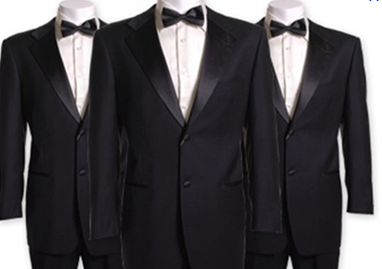The above question may seem rather obvious to most musicians. It is not uncommon to hear musicians declaring that their concert “uniforms” are completely deductible. However, will the IRS agree with this statement? The answer may not be nearly as clear as many musicians think.
Perhaps the best way to address this question is with an example that is typical, at least for symphonic players:
The XYZ Philharmonic requires that its musicians own a black business suit. This suit is worn sometimes with a bow tie, sometimes with a long tie, but the suit is required, by contract, to be worn for many of the XYZ Philharmonic’s performances. John Q. Violist owns a black business suit, which he purchased to wear only for the XYZ Philharmonic’s performances. In fact, John would not be caught dead wearing this black suit anywhere other than the XYZ Philharmonic’s performances. Because John Q. Violist was required by contract to purchase the black business suit, and because he only wears it to performances of the XYZ Philharmonic, is John’s black business suit tax deductible?
The answer to this question may surprise many readers of this article. In fact, the black business described in the above example is not tax deductible. The appropriate test is not if the suit is worn outside of concerts, but can it be used or adapted for everyday wear. Clearly, a black business suit can be worn to funerals, dinners, and various other functions, so it is not tax deductible. Neither the argument that it is only worn for concerts nor the argument that the employer requires it will work with the IRS. Anyone could say certain clothing they purchase is required and only worn on the job; but should a secretary be able to deduct all her skirts and dresses because she only wears them to work? Again, the answer would be no. If the clothing cannot be deducted, then cleaning and maintaining of the same clothing also cannot be deducted.
The next question may well be, “So what is deductible?” This is a bit more complicated and subjective. Generally, more formal clothing that is not suitable or adaptable to everyday wear is deductible. Tails, tuxedos, patent leather shoes (but not regular black shoes), formal (pleated) white shirts (but not regular department store white shirts), formal length black skirts and dresses, sequined blouses, etc. would probably be allowed. Also, any job-specific clothing is deductible. For example, if the above black suit had the XYZ Philharmonic’s name sewn onto the pocket, then the suit would be deductible because it is specific to the XYZ Philharmonic and would not be suitable (this can be rather subjective) for everyday wear. And, if the clothing is tax deductible, then the cleaning and maintaining of the clothing is also tax deductible. However, please note that the some IRS agents may take the position that a white dinner jacket or tuxedo can be worn to other social engagements (like a wedding or black-tie dinner or party) and, therefore, are not deductible.
The following court cases may also help demonstrate that the IRS takes a fairly aggressive position in disallowing deductions for work clothing:
- The IRS disallowed loud and flashy clothing worn onstage by a member of Rod Stewart’s band, stating that the clothing was suitable for personal wear; the tax court later upheld the IRS decision.
- A second case involved a violinist with the Los Angeles Chamber Orchestra. The tax court and the Ninth Circuit Court of Appeals upheld the IRS decision to deny a deduction for required concert clothing; the courts did allow a deduction for the more formal items, such as sequined blouses.
Perhaps the best way to conclude this article is with its title: “Is concert clothing tax deductible?” Hopefully, the above will give all musicians a bit more to think about before deducting their concert clothing.


No comments yet.
Add your comment